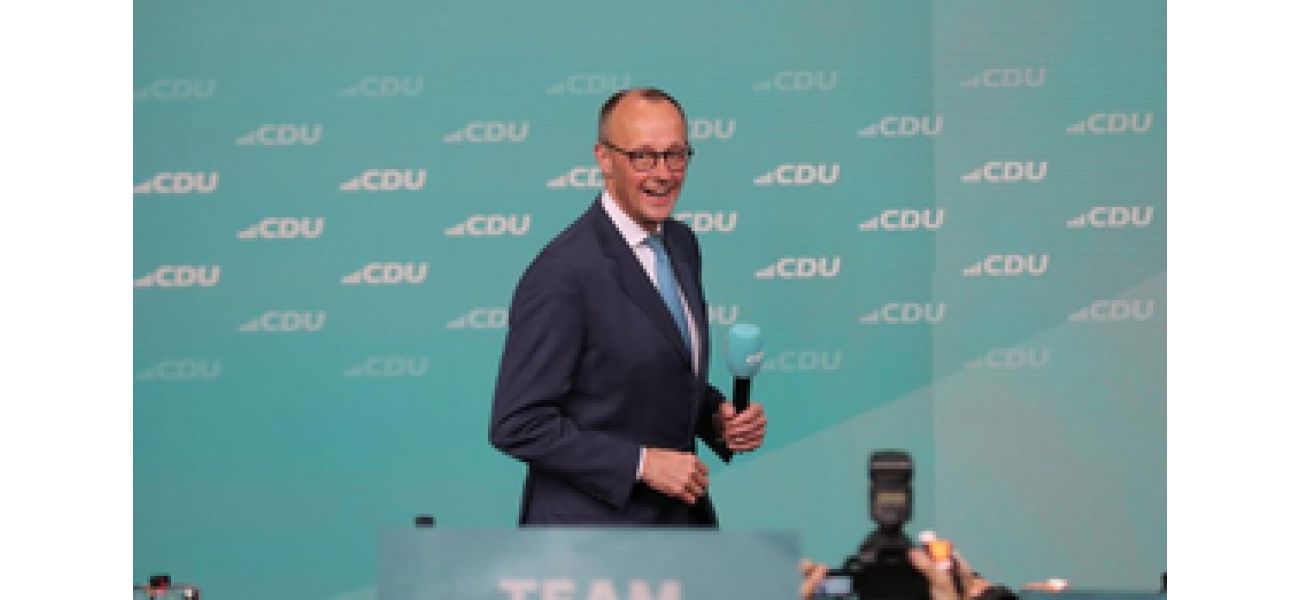Conservatives emerge victorious in recent political race.
Germans elected conservative opposition in a general election due to concerns about economy and immigration. CDU/CSU alliance led by Friedrich Merz won with 29% votes.
February 25th 2025.

The recent general election in Germany saw a shift in power as the conservative opposition was voted into office. The main concerns driving this decision were the stagnant state of the country's economy and growing anti-immigrant sentiment. The Christian Democratic Union of Germany/Christian-Social Union alliance, led by Friedrich Merz, emerged as the winner with 29% of the votes. The Far-Right Alternative für Deutschland secured 21% of the votes, making them the second largest party and almost doubling their previous tally.
The outcome of the election indicates that Merz's Christian Democrats, along with the centre-left Social Democrats, hold the majority of seats in the national legislature. This positions Merz as a strong candidate for the next chancellor of Germany. However, he has made it clear that he will not form a coalition with the AfD, as have all the major parties. A "firewall" has been established to prevent any formal collaboration with the anti-migrant and pro-Kremlin AfD. It is worth noting that the AfD received support from prominent figures such as US President Donald Trump's advisor, Elon Musk, and US Vice President JD Vance during the intense campaign.
Merz's conservative party now holds 208 seats in the 630-seat Bundestag, while the AfD has 152 seats. The three parties that made up the previous governing coalition experienced a loss of seats, with the Social Democratic Party of Germany, led by outgoing Chancellor Olaf Scholz, dropping to 120 and the Greens to 85. The pro-business Free Democrats, who sparked the early elections by withdrawing from the coalition, did not reach the 5% threshold required to gain any seats. The Left party obtained 64 seats, while the leftist Sahra Wagenknecht Alliance fell just short of the threshold.
The German elections also highlighted two interesting contrasts. On one hand, we have Friedrich Merz, a 69-year-old man standing at an impressive height of 6'5''. Known for his misogynistic views, Merz has very few women in his leadership group. He has always been a strong advocate for conservative values and has emphasized the importance of family. In the 1990s, he opposed the liberalization of abortion laws and voted against pre-implantation genetic diagnosis. His most infamous decision was voting against the criminalization of marital rape in 1997. Merz, a lawyer by profession, has faced several delays in reaching the top position, mainly due to former Chancellor Angela Merkel's influence in the early 2000s. After leaving parliament in 2009, he took a break from politics and worked as a lawyer. He also led the supervisory board of the German branch of BlackRock, the world's largest asset manager. Despite his extensive political background, Merz has no prior experience in government, making his journey to the chancellery quite unique.
On the other hand, we have Alice Weidel, the leader of the AfD. Weidel is in a same-sex marriage with a Swiss citizen of Sri Lankan origin and has two adopted sons. She splits her time between Switzerland and Germany. Weidel is an economist by profession and has previously worked with Goldman Sachs and the Bank of China. Interestingly, her grandfather, Hans Weidel, was a Nazi judge appointed directly by Adolf Hitler to pass judgments on those who opposed the Third Reich.
Under Merz's leadership, it will be intriguing to see how Germany, a key NATO member, handles the challenges posed by Russia and, more recently, by the United States with Donald Trump's return sparking global turmoil. Merz has stated that his main focus is to unite Europe in response to these challenges. In a time when the US, under Trump's influence, is disregarding established norms of international cooperation and law, a strong and united Europe is more critical than ever. The question remains, can Merz, as the leader of the European Union's most populous country, make this happen? Only time will tell.
The outcome of the election indicates that Merz's Christian Democrats, along with the centre-left Social Democrats, hold the majority of seats in the national legislature. This positions Merz as a strong candidate for the next chancellor of Germany. However, he has made it clear that he will not form a coalition with the AfD, as have all the major parties. A "firewall" has been established to prevent any formal collaboration with the anti-migrant and pro-Kremlin AfD. It is worth noting that the AfD received support from prominent figures such as US President Donald Trump's advisor, Elon Musk, and US Vice President JD Vance during the intense campaign.
Merz's conservative party now holds 208 seats in the 630-seat Bundestag, while the AfD has 152 seats. The three parties that made up the previous governing coalition experienced a loss of seats, with the Social Democratic Party of Germany, led by outgoing Chancellor Olaf Scholz, dropping to 120 and the Greens to 85. The pro-business Free Democrats, who sparked the early elections by withdrawing from the coalition, did not reach the 5% threshold required to gain any seats. The Left party obtained 64 seats, while the leftist Sahra Wagenknecht Alliance fell just short of the threshold.
The German elections also highlighted two interesting contrasts. On one hand, we have Friedrich Merz, a 69-year-old man standing at an impressive height of 6'5''. Known for his misogynistic views, Merz has very few women in his leadership group. He has always been a strong advocate for conservative values and has emphasized the importance of family. In the 1990s, he opposed the liberalization of abortion laws and voted against pre-implantation genetic diagnosis. His most infamous decision was voting against the criminalization of marital rape in 1997. Merz, a lawyer by profession, has faced several delays in reaching the top position, mainly due to former Chancellor Angela Merkel's influence in the early 2000s. After leaving parliament in 2009, he took a break from politics and worked as a lawyer. He also led the supervisory board of the German branch of BlackRock, the world's largest asset manager. Despite his extensive political background, Merz has no prior experience in government, making his journey to the chancellery quite unique.
On the other hand, we have Alice Weidel, the leader of the AfD. Weidel is in a same-sex marriage with a Swiss citizen of Sri Lankan origin and has two adopted sons. She splits her time between Switzerland and Germany. Weidel is an economist by profession and has previously worked with Goldman Sachs and the Bank of China. Interestingly, her grandfather, Hans Weidel, was a Nazi judge appointed directly by Adolf Hitler to pass judgments on those who opposed the Third Reich.
Under Merz's leadership, it will be intriguing to see how Germany, a key NATO member, handles the challenges posed by Russia and, more recently, by the United States with Donald Trump's return sparking global turmoil. Merz has stated that his main focus is to unite Europe in response to these challenges. In a time when the US, under Trump's influence, is disregarding established norms of international cooperation and law, a strong and united Europe is more critical than ever. The question remains, can Merz, as the leader of the European Union's most populous country, make this happen? Only time will tell.
[This article has been trending online recently and has been generated with AI. Your feed is customized.]
[Generative AI is experimental.]
0
0
Submit Comment





